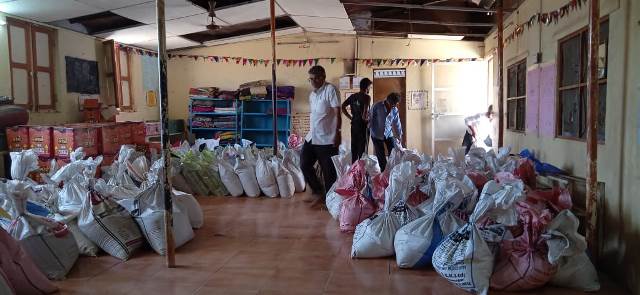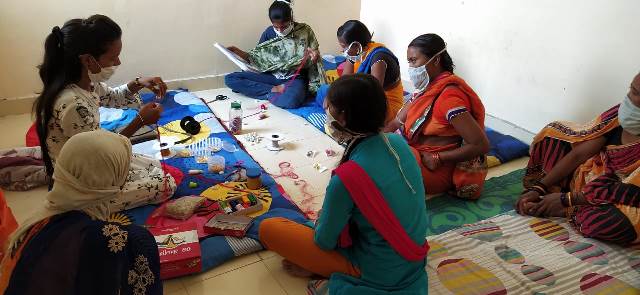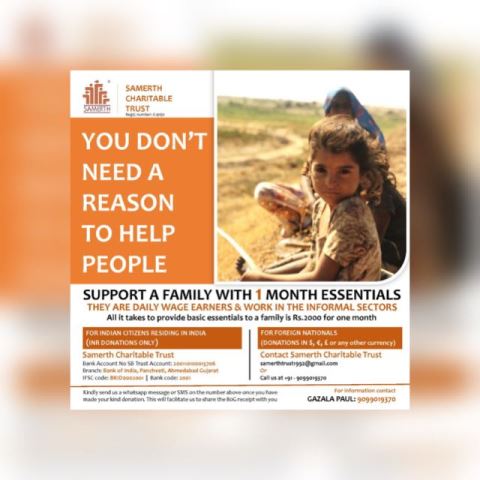While the COVID-19 pandemic is putting humanity through its most testing times, there are stories of hope, resilience, and unwavering human spirit. We have seen volunteers from the general public, NGOs and other community-based organisations, governments, philanthropies and private entities coming together in unprecedented ways. Samerth Charitable Trust is one such organisation that has been on the forefront, supporting the most affected families across Gujarat and Chhattisgarh through their relief work.
The Now – Impact on communities
Samerth is working in Ahmedabad and Rapar (Kutch) in Gujarat and Raipur and Kawardha (Kabirdham) in Chhattisgarh. The work involves a spectrum of vulnerable people - orphaned children and children with intellectual disability (Ahmedabad), migrants returning home (Rapar & Kawardha) and migrants stranded in transit (Raipur), tribal families, daily wage workers, cattle grazers, denotified tribes and artisans (Rapar and Khadir region of Bhachau blocks of Kutch).
“The immediate lockdown has led to over 10,000 native people returning home to the Rapar region, an area with a population of around 2 lakh people”, says Ms. Gazala Paul, Managing Trustee, Samerth, speaking of the scale of reverse migration in Rapar, Gujarat. "A situation in the reverse has unfolded in Chhattisgarh where migrant families from over 10 states have been stranded in Raipur due to the lockdown without food or shelter".
 In Gujarat, Samerth is working with such families through phone-counselling and distributing survival kits (dry ration and hygiene materials) with donations from individual donors and philanthropic organisations.
In Gujarat, Samerth is working with such families through phone-counselling and distributing survival kits (dry ration and hygiene materials) with donations from individual donors and philanthropic organisations.
In Chhattisgarh, it is working with the state to help run the largest shelter home in Raipur along with We the People, another NGO.
It is also helping manage shelter homes in the Kawardha region with the help of the local government and philanthropic organisations. Managing logistics, mobilising volunteers, raising funds for gap in necessities, developing social protocols for the camps and disseminating them are a few things Samerth is currently doing in these camps.
In both locations, Samerth is also focused on engaging those stranded with dignity by teaching the art of jewelry making to the women, engaging men and women to support in cooking, cleaning and policing activities and engaging children through multiple learning and fun activities.
Key lessons
Every disaster builds resilience and provides an opportunity to learn and rebuild. The current situation is no different. Communities have been better prepared from the last disaster, so have NGOs and governments to be able to respond to such situations. There is a need to do more and do it to establish equity in our society.
Ms. Gazala talks about some things that stood out from her experience over the years and conversations with different stakeholders in the current times. “These times have shown that we need to re-look at and redefine what vulnerability means”, she says.
Almost two decades ago from when Ms. Gazala led the field work during rehabilitation of the victims of the Gujarat earthquake of 2001, the people had much lesser than today in terms of money, resources, food, etc.

In the villages where Samerth has worked for water security and livelihoods, the families now have better availability of water and better agricultural yield with a season of cash crops during Rabi and a season of Kharif. However, all that seems immaterial today. With the lockdown, farmers are unable to sell their cash crop harvests and neither are they able to consume them. Even with over 1-1.5 lakhs worth of cumin and other crops, there are families without access to cash and hence without food and other necessities.
Amidst all this, the biggest positive has been the attitude of all stakeholders in tackling the issue with a sense of “We are all in this together”. The Government of Chhattisgarh inviting NGOs such as Samerth to help run shelter homes is an example of the collaboration of strengths. At the district and Gram Panchayat (GP) levels, there has been collaboration on multiple fronts with all the departments coming forward to do their bit to provide relief and support to the migrants and the poor. NGOs like Samerth have been filling the gaps in availability of resources with the district administration by providing necessary kits procured with the help of donations from philanthropies.
Samerth has adapted itself to cater to the needs of the situation with their team prioritising the need to help their communities and coordinating with multiple stakeholders for the relief work in a short span of time. So far, they have reached out to 3500 families in Chhattisgarh, 2000 families in Kutch and 400 families in Ahmedabad. You can read more about their work and find updates on their Facebook and Instagram pages.
If you wish to support them in their work, please consider donating to Samerth (details below):














